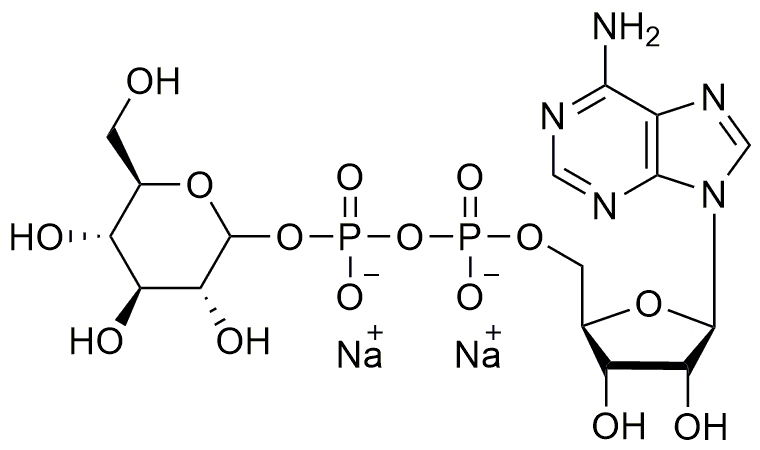Adenosine-5'-diphosphoglucose disodium salt is widely utilized in research focused on:
- Biochemical Research: This compound serves as a crucial substrate in enzymatic reactions, particularly in studies involving glycogen synthesis and metabolism, helping researchers understand energy storage mechanisms in cells.
- Pharmaceutical Development: It is used in the formulation of drugs aimed at enhancing cellular energy levels, which can be beneficial in treating conditions like muscle fatigue or metabolic disorders.
- Cell Culture Applications: The compound is often added to cell culture media to promote cell growth and viability, making it essential for studies in tissue engineering and regenerative medicine.
- Metabolic Studies: Researchers utilize it to investigate metabolic pathways and energy transfer processes, providing insights into diseases such as diabetes and obesity.
- Analytical Chemistry: It is employed as a standard in various assays to quantify enzyme activity related to glucose metabolism, aiding in the development of diagnostic tools.
Informations générales
Propriétés
Sécurité et réglementation
Applications
Adenosine-5'-diphosphoglucose disodium salt is widely utilized in research focused on:
- Biochemical Research: This compound serves as a crucial substrate in enzymatic reactions, particularly in studies involving glycogen synthesis and metabolism, helping researchers understand energy storage mechanisms in cells.
- Pharmaceutical Development: It is used in the formulation of drugs aimed at enhancing cellular energy levels, which can be beneficial in treating conditions like muscle fatigue or metabolic disorders.
- Cell Culture Applications: The compound is often added to cell culture media to promote cell growth and viability, making it essential for studies in tissue engineering and regenerative medicine.
- Metabolic Studies: Researchers utilize it to investigate metabolic pathways and energy transfer processes, providing insights into diseases such as diabetes and obesity.
- Analytical Chemistry: It is employed as a standard in various assays to quantify enzyme activity related to glucose metabolism, aiding in the development of diagnostic tools.
Documents
Fiches de données de sécurité (FDS)
La FDS fournit des informations de sécurité complètes sur la manipulation, le stockage et l’élimination du produit.
Spécifications du produit (PS)
Le PS fournit une description complète des propriétés du produit, notamment sa composition chimique, son état physique, sa pureté et les exigences de stockage. Il détaille également les plages de qualité acceptables et les applications prévues du produit.
Certificats d'analyse (COA)
Recherchez des certificats d'analyse (COA) en saisissant le numéro de lot du produit. Les numéros de lot et de lot se trouvent sur l'étiquette d'un produit, après les mots « Lot » ou « Lot de fabrication ».
Numéro de catalogue
Numéro de lot/série
Certificats d'origine (COO)
Ce certificat d'exploitation confirme le pays dans lequel le produit a été fabriqué, et détaille également les matériaux et composants utilisés et s'il est issu de sources naturelles, synthétiques ou autres sources spécifiques. Ce certificat peut être requis pour les douanes, le commerce et la conformité réglementaire.
Numéro de catalogue
Numéro de lot/série
Fiches de données de sécurité (FDS)
La FDS fournit des informations de sécurité complètes sur la manipulation, le stockage et l’élimination du produit.
DownloadSpécifications du produit (PS)
Le PS fournit une description complète des propriétés du produit, notamment sa composition chimique, son état physique, sa pureté et les exigences de stockage. Il détaille également les plages de qualité acceptables et les applications prévues du produit.
DownloadCertificats d'analyse (COA)
Recherchez des certificats d'analyse (COA) en saisissant le numéro de lot du produit. Les numéros de lot et de lot se trouvent sur l'étiquette d'un produit, après les mots « Lot » ou « Lot de fabrication ».
Numéro de catalogue
Numéro de lot/série
Certificats d'origine (COO)
Ce certificat d'exploitation confirme le pays dans lequel le produit a été fabriqué, et détaille également les matériaux et composants utilisés et s'il est issu de sources naturelles, synthétiques ou autres sources spécifiques. Ce certificat peut être requis pour les douanes, le commerce et la conformité réglementaire.


